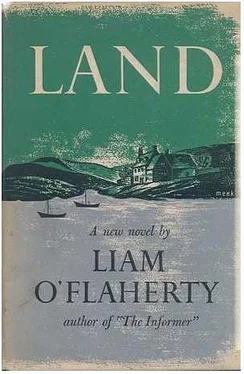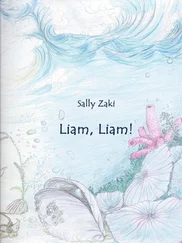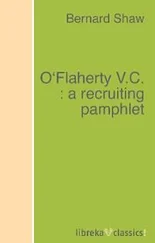Liam O'Flaherty - Land
Здесь есть возможность читать онлайн «Liam O'Flaherty - Land» весь текст электронной книги совершенно бесплатно (целиком полную версию без сокращений). В некоторых случаях можно слушать аудио, скачать через торрент в формате fb2 и присутствует краткое содержание. Город: London, Год выпуска: 2011, ISBN: 2011, Издательство: Bloomsbury Publishing, Жанр: Проза, на английском языке. Описание произведения, (предисловие) а так же отзывы посетителей доступны на портале библиотеки ЛибКат.
- Название:Land
- Автор:
- Издательство:Bloomsbury Publishing
- Жанр:
- Год:2011
- Город:London
- ISBN:9781448203888
- Рейтинг книги:3 / 5. Голосов: 1
-
Избранное:Добавить в избранное
- Отзывы:
-
Ваша оценка:
- 60
- 1
- 2
- 3
- 4
- 5
Land: краткое содержание, описание и аннотация
Предлагаем к чтению аннотацию, описание, краткое содержание или предисловие (зависит от того, что написал сам автор книги «Land»). Если вы не нашли необходимую информацию о книге — напишите в комментариях, мы постараемся отыскать её.
Land — читать онлайн бесплатно полную книгу (весь текст) целиком
Ниже представлен текст книги, разбитый по страницам. Система сохранения места последней прочитанной страницы, позволяет с удобством читать онлайн бесплатно книгу «Land», без необходимости каждый раз заново искать на чём Вы остановились. Поставьте закладку, и сможете в любой момент перейти на страницу, на которой закончили чтение.
Интервал:
Закладка:
“Needless to say,” Elizabeth wrote, “Michael’s death was less of a shock to me than it was to Lettice. The dear child has plenty of courage, but she is still somewhat stunned by the terrible blow. She begs to be forgiven for not writing to you this time. She says that you will understand. Poor Michael! He was one of those on whose foreheads tragedy is written for even the least intelligent to read. God forgive me! I hated him at first. I knew instinctively that there never could be peace where he was and that to know him meant to suffer. Later on, though, I came to love him deeply. So that his going is a great loss to me. Of course, one cannot feel sorrow in the ordinary way for one so strong and so certain of his purpose. It would be like a common sparrow mourning a royal eagle, that has fallen in all its glory. The people certainly don’t mourn for him. On the contrary, they feel proud and triumphant, as if they had won a great victory. Perhaps it is that his spirit has passed into them. Raoul, I have never in my life seen anything like his funeral. The whole parish was there. Thousands of other people came from far and near. Yet it was the public emotion, rather than the numbers, that was so impressive. I got completely carried away by the sincere love visible in every eye. I didn’t think our people were capable of it. It seems they are. As I said before, pride was the dominant note. When they wept, it was for our brave little schoolmaster. I find it hard to understand how such a wayward and seemingly weak man could prove to be a hero. Yet there it is. One really knows very little about the human soul. Father Cornelius is a case in point. I had entertained harsh thoughts of him for some time. Now I have completely reversed my opinion. He has behaved wonderfully towards us during our crisis. I was moved to tears by the beautiful sermon he preached in praise of Michael and the schoolmaster. Of course, our cynical Tim Ahearn maintains that Father Cornelius is merely swimming with the tide like a skilful politician, now that the landlords are certain to be defeated, owing to the Americans and the English factory workers supporting Ireland’s cause. Tim always sees the worst side of things. It is true that Father Cornelius, like all of is, has his bad side, if shrewdness is to be considered bad. Yet one must face facts. It requires courage for a priest to come out openly on his altar and preach a sermon in praise of two Fenians that died in action. Coercion is at its height. The Government has sent a battalion of Scottish infantry to Clash, with orders to cow the people at all costs, no matter how brutal their behaviour. The ruffians need little encouragement. The Constabulary are completely discredited, as they have been unable to make a single arrest in connection with Captain Butcher’s death. The Government people are furious at the handsome way the Fenians behaved towards the four policemen they captured, merely taking their military equipment and then turning them loose, after having attended to the wounded man. Tyrants fear disciplined opponents. By the way, Father Cornelius is preparing a tremendous reception for you on your…”
“Damn Father Cornelius!” said Raoul as he put away the letter.
He was very agitated. He sat down and began to pick oakum in an effort to regain his calm. The senseless labour merely irritated him still further. After a while, he threw the pieces of foul rope back into the basket and clasped his hands before his chest. He looked up at the little window. A faint ray of sunshine was creeping along the iron bars. He was overcome by an almost unbearable loneliness.
He threw back his head and cried out with great fervour:
“Oh! How I envy him the way he died!”
Chapter XXXVIII
Raoul was bewildered by the huge throng that awaited him at Clash railway station on his release from jail. As the train came slowly to a halt, three large brass bands played a triumphal march. The music was barely audible above the cheering of an enormous throng that stood in the market place beyond the tall iron railings. The platform was crowded with notable people from all over the county. There were mayors in their robes and chains of office, other public officials wearing ornamented sashes over their morning suits, officers of patriotic societies with beribboned badges pinned to their chests, over thirty priests of all ranks and scores of distinguished private citizens. Lettice and Elizabeth stood at the very front of this multitude, accompanied by the master of ceremonies and by the representatives of the Press. Both were dressed in deep mourning.
As Raoul stepped from the carriage, the important people on the platform uncovered their heads and bowed ceremoniously. The people in the market place threw their hats into the air and redoubled their cheering. Lettice and Elizabeth came forward and embraced Raoul. Then the master of ceremonies took charge. An address of welcome was read in most flowery language by a tall and handsome old parish priest. Several other men also delivered short addresses. Then the party advanced to a large, brightly painted carriage that stood waiting outside the station. Four bob-tailed grey horses, all in splendid condition and carefully groomed, were harnessed to the carriage. Raoul mounted after taking leave of the reception committee. Lettice sat beside him. Elizabeth sat opposite. Preceded by the three brass bands, the carriage advanced at a stately pace towards the town square. A long column of other carriages came after it. The crowd surged along on all sides, singing patriotic songs.
After they had gone a little way, Raoul turned to Elizabeth and said in a tone of annoyance:
“Whose carriage is this?”
Elizabeth was beaming. She obviously enjoyed every bit of the fuss that was being made of her brother.
“Father Cornelius insisted on your having it,” she said. “To-day, he said, you are a guest of the county. This carriage comes from the livery stables here in town. It’s a very good thing, in any case, that Tim Ahearn is not driving us. We would have been disgraced before this vast crowd. You’ve no idea to what extent he has relapsed into his slovenly habits since you went to jail.”
“So I’m a guest of Father Costigan,” said Raoul, putting his fingers to the tip of his beard.
“You are a guest of the people,” Elizabeth said. “They are all grateful to you.”
“Timeo Danaos et dona ferentes,” Raoul said.
“What’s that?” said Elizabeth.
“They very obviously think that I, too, am dead,” Raoul said, “and therefore no longer a menace to them.”
“Don’t be frivolous, Raoul,” said Elizabeth. “Please raise your hat and bow to these good people who are cheering you.”
“Must I?” said Raoul as he raised his hat and bowed in all directions. “Father Francis didn’t come to meet me, I see.”
“It’s not because he doesn’t love you,” Lettice said. “It’s just that he is very sensitive about appearing in public where there are other priests.”
“Father Francis is very sensitive,” Elizabeth said.
“I understand,” said Raoul. “I thought of him a great deal while I was in jail. He has become very important to me.”
“To all of us,” Lettice said with feeling.
“Good Heavens!” said Raoul. “What is happening now?”
“I beg of you to behave, Raoul,” said Elizabeth anxiously. “This is a further little surprise staged by Father Cornelius.”
The carriage was now passing through the square, abreast of the headless English general. A group of bare-headed young athletes seized the horses, brought them to a halt and began to unfasten the harness. At the same time, from the direction of the Manister road, Father Cornelius came riding on a magnificent bay hunter. He was followed by a troop of fifty horsemen. He dismounted with a supple grace of a young man when he reached the carriage.
Читать дальшеИнтервал:
Закладка:
Похожие книги на «Land»
Представляем Вашему вниманию похожие книги на «Land» списком для выбора. Мы отобрали схожую по названию и смыслу литературу в надежде предоставить читателям больше вариантов отыскать новые, интересные, ещё непрочитанные произведения.
Обсуждение, отзывы о книге «Land» и просто собственные мнения читателей. Оставьте ваши комментарии, напишите, что Вы думаете о произведении, его смысле или главных героях. Укажите что конкретно понравилось, а что нет, и почему Вы так считаете.












